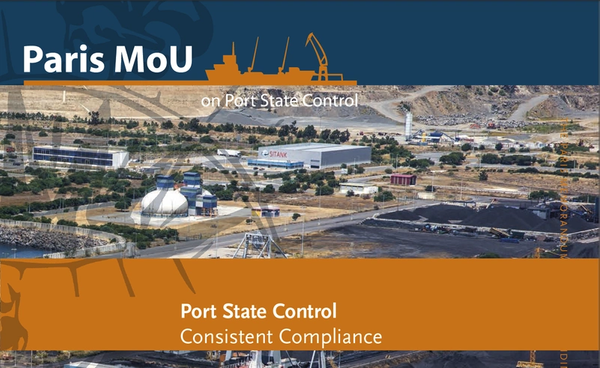
“Consistent Compliance” : The Paris MoU has published its 2018 Annual Report on July 1, 2019, which can be found on the website. This report contains the details of the activities of the Paris MoU during 2018.
In 2018 there were 24 Refusal of Access Orders (referred to as “bannings”) issued. This shows a decrease from 32 in 2017. Refusal of access (banning) has been used 77 times since 2016.
The detention percentage decreased to 3.15% (from 3.87%) and the number of detainable deficiencies also decreased to 3,171 (from 3,883 in 2017). The number of inspections carried out was 17,952; this is slightly higher than in 2017 (17,923).
A Concentrated Inspection Campaign (CIC) on MARPOL Annex VI was carried out from September to November 2018. The general conclusion was that the overall compliance with MARPOL Annex VI was satisfactory. However, the industry is reminded to ensure that a fuel change-over procedure is provided on board and used as required and that bunker delivery notes are kept on board for a minimum of three years.
Over the past three years 73 ships have been banned for multiple detentions and four ships were banned for “failing to call at an indicated repair yard”. Ten of these ships were banned for a second time.
Over the three year period, 2016-2018, the flags of Comoros, the United Republic of Tanzania and Togo have recorded the highest number of bannings.
Looking at the Paris MoU “White, Grey and Black List” the overall situation seems to be stabilizing. Although some flag States have moved between lists, the total number of 41 flags on the “White List” is almost similar to that in 2017 (40). The Grey List contains 18 flags (20 in 2017) and the Black List 14 flags (13 in 2017).
Recognized Organizations (ROs) are authorized by flag States to carry out statutory surveys on their behalf. For this reason, it is important to monitor their performance, which is why a performance list for ROs is presented in the Annual Report. Out of 566 detentions recorded in 2018, 97 (17%) were considered RO related (14.3% in 2017).
The number of inspections is stabilizing. The detention percentage in 2018 (3.15%) however shows a significant decrease compared to 2016 (3.85%) and 2017 (3.87%). The level of detainable deficiencies has decreased as well from 3,883 in 2017 to 3,171 this year.
Members performing the largest number of inspections are: Spain, the United Kingdom, Italy, the Russian Federation, the Netherlands, Germany and France. Together, these Members jointly accounted for 52% of the total number of inspections during 2018.
With 1,098 inspections and 145 detentions the ships flying a “Black-listed flag“ had a detention rate of 13.2%, which is substantially less than the 16.9% in 2017. For ships flying a “Grey-listed flag” the detention rate was 6.4%, which is lower than the 7.4% in 2017. Ships flying a “White-listed flag” had a detention rate of 2.3% which is slightly less than in 2017 (2.5%) and 2016 (2.6%).
The five most frequently recorded deficiencies in 2018 were “ISM” (4.73%, 1,911), “fire doors/openings in fire-resisting divisions” (2.62%, 1057), “nautical publications” (2.01%, 811), “charts” (1.72%, 693) and “oil record book” (1.64%, 661). The first four are consistent with 2016. Relatively, the total number of the top five has slightly increased from 12.6% in 2017 to 12.7% this year.



